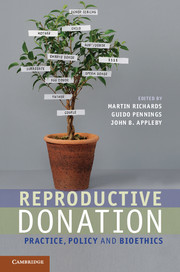Book contents
- Frontmatter
- Contents
- Contributors
- Acknowledgements
- 1 Introduction
- 2 The biology of donation
- 3 Ethics for reproductive donation
- 4 Parenthood – whose right is it anyway?
- 5 Reproductive donation
- 6 UK and US perspectives on the regulation of gamete donation
- 7 Gamete and embryo donation
- 8 The legal and ethical regulation of transnational donation
- 9 Balancing ethical criteria for the recruitment of gamete donors
- 10 Challenges in intra-family donation
- 11 ARTs and the single parent
- 12 Reproductive donation and justice for gay and lesbian couples
- 13 Is disclosure in the best interests of children conceived by donation?
- 14 Identifiable donors and siblings
- 15 Ethical issues in embryo donation
- 16 Reproduction through surrogacy
- 17 Some conclusions regarding the interaction of normative and descriptive elements in reproductive donation
- Index
- References
13 - Is disclosure in the best interests of children conceived by donation?
Published online by Cambridge University Press: 05 August 2012
- Frontmatter
- Contents
- Contributors
- Acknowledgements
- 1 Introduction
- 2 The biology of donation
- 3 Ethics for reproductive donation
- 4 Parenthood – whose right is it anyway?
- 5 Reproductive donation
- 6 UK and US perspectives on the regulation of gamete donation
- 7 Gamete and embryo donation
- 8 The legal and ethical regulation of transnational donation
- 9 Balancing ethical criteria for the recruitment of gamete donors
- 10 Challenges in intra-family donation
- 11 ARTs and the single parent
- 12 Reproductive donation and justice for gay and lesbian couples
- 13 Is disclosure in the best interests of children conceived by donation?
- 14 Identifiable donors and siblings
- 15 Ethical issues in embryo donation
- 16 Reproduction through surrogacy
- 17 Some conclusions regarding the interaction of normative and descriptive elements in reproductive donation
- Index
- References
Summary
Introduction
In families in which parents conceived using donated sperm or donated eggs, only one parent will be the genetic parent of the child: the mother in the case of sperm donation and the father in the case of egg donation. Parents can choose to tell or not to tell their child about their donor conception. In families in which parents choose not to tell, children will grow up unaware that the person that they think of as their mother or father is not, in fact, their genetic parent. Furthermore, families in which children were conceived using an anonymous donor will likely never be able to know detailed or identifying information about their donor. In countries where donor anonymity has ended and donor-conceived adults are able to access information about their donor, it is still the case that if someone does not know they were donor conceived they will have no reason to access information about their donor. Therefore, is it in the child’s best interests to be told about their donor conception?
This chapter outlines empirical research and ethical reasoning to discuss whether disclosure of donor origins is in a child’s best interests. Our discussion considers deontological (duty-based) and consequentialist (outcome-based) ethics in relation to disclosure. We hold that the question of whether to disclose can best be answered by reviewing at least three types of considerations for each child: (1) medical welfare; (2) family welfare; and (3) rights. These considerations build on the established empirical evidence presented in the first half of this chapter. Our intention is to clarify reasons why telling or not telling may be the best decision.
- Type
- Chapter
- Information
- Reproductive DonationPractice, Policy and Bioethics, pp. 231 - 249Publisher: Cambridge University PressPrint publication year: 2012
References
- 8
- Cited by

